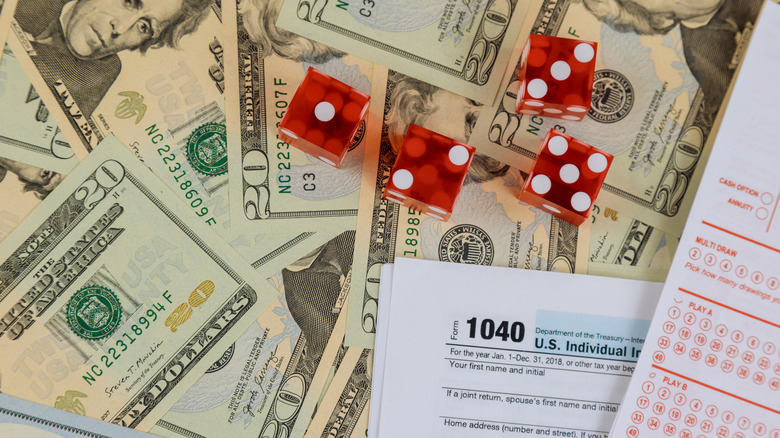Here's How To Pay Taxes On Gambling Winnings And Losses
There's nothing quite like the thrill of a big gambling win. Whether it was your numbers being pulled for the mega jackpot, having your team come back for a miraculous win, or hitting that crucial card in a high-stakes game of poker, the feeling can be exhilarating. Many Americans have put their money on the line in hopes of big wins, as the American Gaming Association can attest to with its revenue tracker — gambling is a multi-billion dollar industry. However, once the excitement of a big win has subdued, and you're left wondering how to spend your spoils, you need to consider how much of it goes to your taxes.
When done responsibly and depending on the person, legal gambling could be a way to add some extra income alongside your regular job. But understandably, it can come with some major losses as well. So it's important to know your limit and reach out to organizations such as Gambler's Anonymous, if you or anyone you know may seem like they're having difficulty with a gambling addiction.
When it comes to dealing with your winnings and losses come tax time, there are many stipulations that you should consider because at the end of the day the government will want a little piece of the action. Let's take a look at how to properly handle your winnings and losses when it comes to your income taxes.
How do you pay your taxes on gambling winnings?
Whether you win big or just take in a small amount from gambling, it's considered income and is subject to taxation if it's over a certain amount. This means that any winnings from a wide variety of legal gambling should be reported on your annual income taxes and paid at a flat rate to the federal government, according to the Internal Revenue Service. For winnings over $5,000 from the lottery, poker, sweepstakes, or earned from a wager that is 300 times the bet you placed, you would be subject to a 24% income tax that would be withheld from the payer. According to the IRS, if you earn these winnings, then you should obtain and file Form W2-G, which will report your winnings and how much of it was withheld. That way you don't have to pay double the amount when it comes time to file your income taxes.
When you receive and fill out your Form W-2G, you should then report the amount on "Form 1040 or 1040-SR, along with all other federal income tax withheld, as shown on Forms W-2 and 1099," according to the IRS. It's also good to note that if you happen to earn winnings from bingo, keno, or even slot machines — if it's below a certain amount (e.g., a slots-machine jackpot below $1,200), the income tax on these earnings would not be withheld from the payer. In that case, you would likely be asked for your SSN information and then have to claim the amount on that year's income taxes.
What to do about your gambling losses come tax time
Chances are if you're a recreational gambler, your total losses over time may far exceed the amount you actually win. If you're not a professional gambler, you can technically deduct some of your gambling losses. It's incredibly important if you want to deduct these losses that you keep itemized records with plenty of proof. With your information in hand, you can fill out Schedule A (Form 1040) for the tax year in question. However, you cannot deduct losses that exceed the amount you've claimed as your gambling income, according to the Internal Revenue Service. This means that you cannot claim an income loss with regard to gambling in order to lower your yearly income or try to earn a tax refund.
If you're considered a professional gambler and fill out annual income taxes as such, then there are certain things that you can deduct. For example, if you run the circuit of professional poker tournaments and travel to attend these events, you could deduct travel expenses, such as plane tickets or gas, hotel fees, and food, per Play USA. As a professional, you can also deduct your gambling losses; however, just like the recreational gambler, you cannot claim more than what you have won in the year. Although these deductions don't necessarily have to be itemized, it would be in your best interest to keep accurate and concise records in order to avoid a tax audit.
Other stipulations on gambling taxes
There's a standard 24% income tax on all gambling winnings that exceed a certain amount and is collected on the federal level. However, depending on which state you live in, you may be subject to even more taxes. States that don't ask their citizens to pay income tax, such as Alaska, Florida, New Hampshire, Nevada, South Dakota, Tennessee, Texas, Washington, and Wyoming, will not tax additionally on your gambling winnings. However, there's a list of states that do require you to pay income tax on your winnings from gambling, with some places putting an exception on earnings made by the lottery.
Big money lotteries such as the Powerball — which can reach staggering amounts — can attract hopefuls from all over the United States and Canada. But how does taxation work on these mega lotteries? According to CNBC, it's the same as noted above: 24% of federal withholding in the U.S., but the top income tax rate is 37% (for salaries starting at $578,100), which will need to be factored in as well.
Also, there are plenty of finicky laws regarding lottery wins across the border, so it'll pay off to be properly informed before you enter another country in order to purchase lottery tickets or buy out-of-country lotto from your place of residence. When dealing with gambling and taxes, it's important to play it safe and keep accurate records so that you don't run into any future problems.



